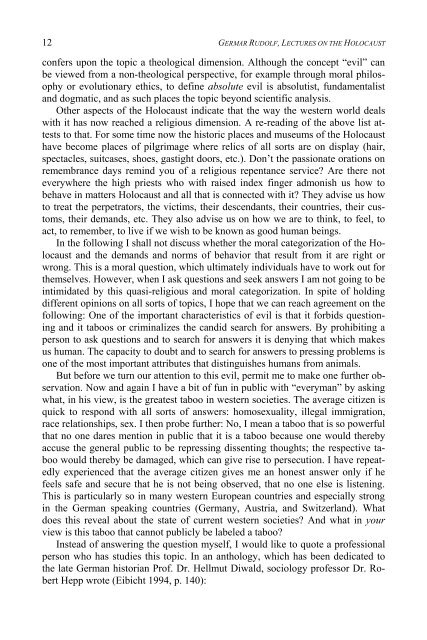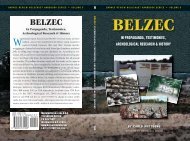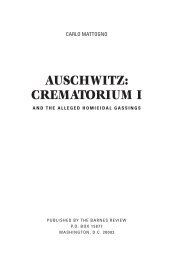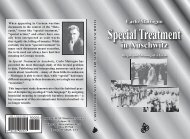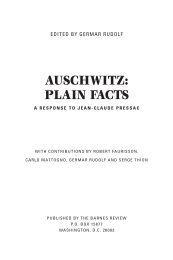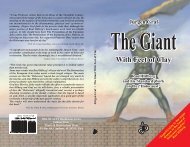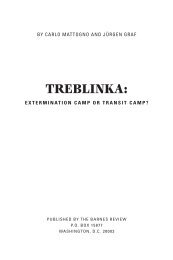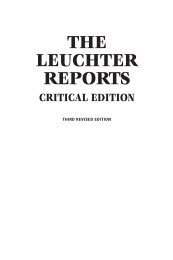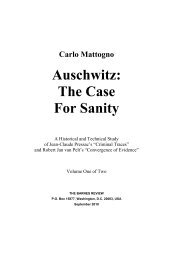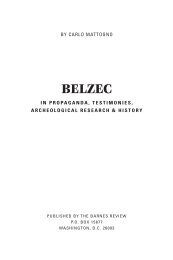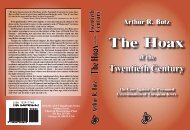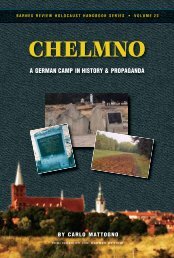15-loth-intro.pdf - The Barnes Review
15-loth-intro.pdf - The Barnes Review
15-loth-intro.pdf - The Barnes Review
- No tags were found...
You also want an ePaper? Increase the reach of your titles
YUMPU automatically turns print PDFs into web optimized ePapers that Google loves.
12 GERMAR RUDOLF, LECTURES ON THE HOLOCAUSTconfers upon the topic a theological dimension. Although the concept “evil” canbe viewed from a non-theological perspective, for example through moral philosophyor evolutionary ethics, to define absolute evil is absolutist, fundamentalistand dogmatic, and as such places the topic beyond scientific analysis.Other aspects of the Holocaust indicate that the way the western world dealswith it has now reached a religious dimension. A re-reading of the above list atteststo that. For some time now the historic places and museums of the Holocausthave become places of pilgrimage where relics of all sorts are on display (hair,spectacles, suitcases, shoes, gastight doors, etc.). Don’t the passionate orations onremembrance days remind you of a religious repentance service? Are there noteverywhere the high priests who with raised index finger admonish us how tobehave in matters Holocaust and all that is connected with it? <strong>The</strong>y advise us howto treat the perpetrators, the victims, their descendants, their countries, their customs,their demands, etc. <strong>The</strong>y also advise us on how we are to think, to feel, toact, to remember, to live if we wish to be known as good human beings.In the following I shall not discuss whether the moral categorization of the Holocaustand the demands and norms of behavior that result from it are right orwrong. This is a moral question, which ultimately individuals have to work out forthemselves. However, when I ask questions and seek answers I am not going to beintimidated by this quasi-religious and moral categorization. In spite of holdingdifferent opinions on all sorts of topics, I hope that we can reach agreement on thefollowing: One of the important characteristics of evil is that it forbids questioningand it taboos or criminalizes the candid search for answers. By prohibiting aperson to ask questions and to search for answers it is denying that which makesus human. <strong>The</strong> capacity to doubt and to search for answers to pressing problems isone of the most important attributes that distinguishes humans from animals.But before we turn our attention to this evil, permit me to make one further observation.Now and again I have a bit of fun in public with “everyman” by askingwhat, in his view, is the greatest taboo in western societies. <strong>The</strong> average citizen isquick to respond with all sorts of answers: homosexuality, illegal immigration,race relationships, sex. I then probe further: No, I mean a taboo that is so powerfulthat no one dares mention in public that it is a taboo because one would therebyaccuse the general public to be repressing dissenting thoughts; the respective taboowould thereby be damaged, which can give rise to persecution. I have repeatedlyexperienced that the average citizen gives me an honest answer only if hefeels safe and secure that he is not being observed, that no one else is listening.This is particularly so in many western European countries and especially strongin the German speaking countries (Germany, Austria, and Switzerland). Whatdoes this reveal about the state of current western societies? And what in yourview is this taboo that cannot publicly be labeled a taboo?Instead of answering the question myself, I would like to quote a professionalperson who has studies this topic. In an anthology, which has been dedicated tothe late German historian Prof. Dr. Hellmut Diwald, sociology professor Dr. RobertHepp wrote (Eibicht 1994, p. 140):


